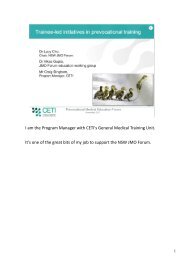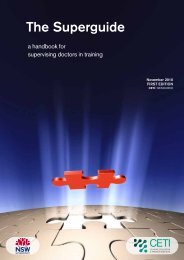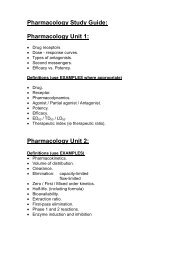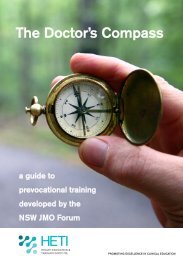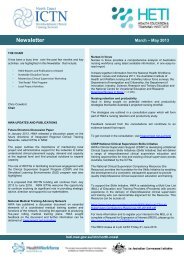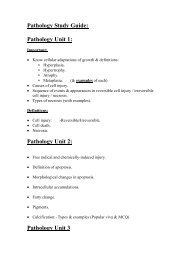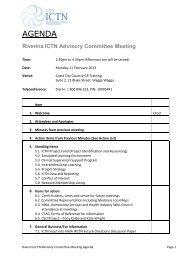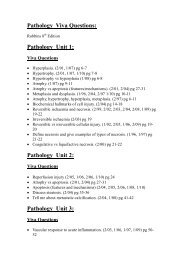Network principles for prevocational medical training - HETI
Network principles for prevocational medical training - HETI
Network principles for prevocational medical training - HETI
You also want an ePaper? Increase the reach of your titles
YUMPU automatically turns print PDFs into web optimized ePapers that Google loves.
Specific assessable assignments as part of term-specific teaching are recommended (eg, case<br />
presentation to peers, teaching <strong>medical</strong> students).<br />
• z Supervisors who understand the importance of teaching and providing feedback to trainees.<br />
This requires that supervisors:<br />
zz<br />
zz<br />
zz<br />
have sufficient time and resources to fulfil these responsibilities<br />
are supported with <strong>training</strong> in core skills of supervision and teaching<br />
are provided with feedback about their per<strong>for</strong>mance as supervisors.<br />
• z A workplace culture supportive of <strong>training</strong> and education, with <strong>training</strong> and support <strong>for</strong> all<br />
levels of the work<strong>for</strong>ce and a commitment to continuous professional development. Good<br />
<strong>prevocational</strong> <strong>training</strong> cannot occur in a vacuum: the understanding and support of all staff from<br />
the Chief Executive down are required. This requires a significant commitment of resources,<br />
including <strong>for</strong> the Director of Prevocational Training in each facility to fulfil the responsibilities of<br />
the position description and support term supervisors and trainees.<br />
<strong>Network</strong> lecture series<br />
The education portfolio group of the JMO Forum has outlined a lecture series <strong>for</strong> JMOs to ensure<br />
that JMOs receive lectures on the most pressing topics early in their intern year, and to promote<br />
concordance between the lecture series of different <strong>training</strong> sites, so that JMOs don’t miss topics or<br />
repeat topics when they go on rotation.<br />
The Prevocational Training Council of NSW endorses the unified lecture series as a concept, and<br />
recommends it to DPETs as an aid to coordinating JMO education across each <strong>training</strong> network.<br />
Several <strong>training</strong> sites and networks have adopted the unified lecture series <strong>for</strong> their education<br />
program. Others are adapting the series to suit local circumstances, and a third group are<br />
continuing with their own lecture programs.<br />
The essential features of the network lecture series are:<br />
• z All trainees have access to the lectures. Usually, this is because the lectures are held at the<br />
local facility, but it can be because trainees are able to travel to another facility <strong>for</strong> lectures (eg,<br />
a trainee on a GP rotation returns to the hospital <strong>for</strong> lectures), or because trainees at a small<br />
facility are able to attend lectures elsewhere by videoconference.<br />
• z Lectures are held in protected teaching time. This means that trainees are released from clinical<br />
duty to attend, and that somebody holds their pagers <strong>for</strong> them during lectures to prevent<br />
interruptions.<br />
• z Lectures are organised locally by DPETs, but there is coordination at a network level to<br />
avoid trainees missing topics or repeating topics when they go on rotation. This may not be<br />
completely avoidable, but networks should be developing options to overcome the problem,<br />
such as recording lectures or providing online tutorials <strong>for</strong> trainees who cannot come to the live<br />
event.<br />
• z Trainee evaluations of the lectures are routinely collected and used to improve the series.<br />
• z Trainee attendance at the lectures is recorded and reported.<br />
20



